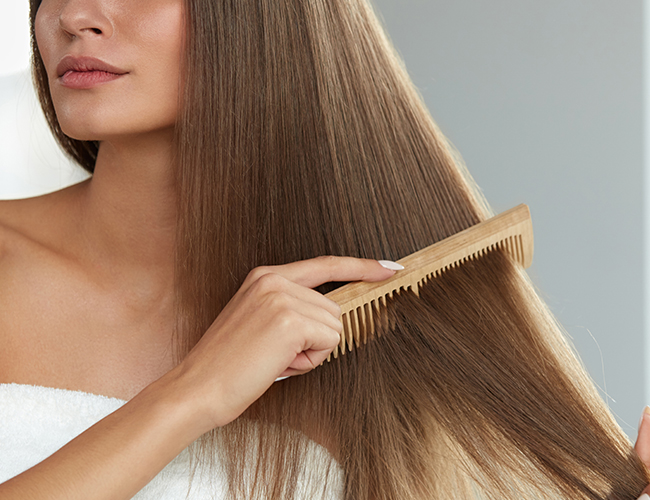The One Tip Doctors Swear By For Stimulating Hair Growth
January 3, 2022 by Marissa Matozzo
Whether you’re experiencing hair loss or instantly regretting your new haircut and want it back to a longer length, we’ve all been there. Sometimes nothing can be more frustrating than growing your hair out and awaiting results. We reached out to dermatologists, trichologists and nutritionists about a trusted way to stimulate hair growth and found one that so many agreed upon— maintaining a healthy and consistent diet.
You’ve probably heard this before and it’s worth mentioning again— if you’ve tried hair masks, scalp massages, avoiding heat tools and over-shampooing for hair growth all to no avail— you must look to your diet. No single product can make your hair grow without simultaneously consuming the right foods. How you nourish your hair matters and we’ve gathered expert-approved tips on what to eat (and what not to eat) for hair growth.
What to Eat for Hair GrowthIf you’ve heard the term “healthy diet” for the umpteenth time and don’t know where to begin, it’s important to acknowledge your hair growth goals and add specific foods for hair health when meal planning. We spoke to Dr. Emmanuel Loucas, dermatologist and director of SINY and Water’s Edge Dermatology about the essential foods that stimulate hair growth.
“Hair is made of proteins, so a diet balanced with protein can help hair health,” says Loucas. Foods high in protein include: chicken, turkey, fish, dairy, eggs, legumes ( i.e. beans), and nuts. Dr. Loucas also suggests essential fatty acids that contain omega-3 & 6 fatty acids, such as fish, pumpkin and flax seeds, walnuts, enriched breads and pastas. All of these, he says, can help prevent dryness in hair. Loucas also says that fatty fish (salmon), red meat, shrimp, oysters, soybeans/beans, nuts, seeds, sweet peppers, sweet potatoes, avocados, eggs, berries and spinach “will help promote hair health.”
“It is also essential that you take in a healthy balance of vitamins and minerals such as vitamins A, C, E, zinc and selenium,” says Loucas. Selenium is a trace mineral that has an important role in hair growth. It is a major nutrient with many hair benefits and can be obtained from Brazil nuts, seafoods, organ meats, cereals and other grains.
Dr. Dominic Burg, trichologist and Chief Scientist for Evolis Professional tells SheFinds that while selenium is “essential” for hair growth, “too much” of the element can also cause toxicity. “Selenium toxicity is associated with hair loss,” says Burg. “Selenium is at high levels in certain foods such as Brazil nuts so you should avoid eating handfuls of Brazil nuts, particularly if also taking supplements containing selenium.” Burg notes that he “wouldn’t avoid them altogether, as they are very good for you, but just stick to one or two.”
It’s all about moderation with selenium, and not consuming excessive amounts. Read on for other kinds of foods to look out for that may deter your hair’s healthy growing or even contribute to hair loss.


